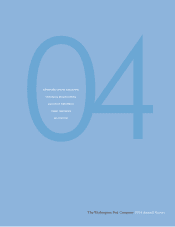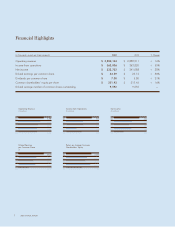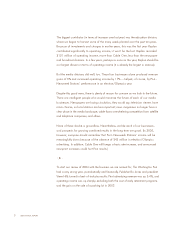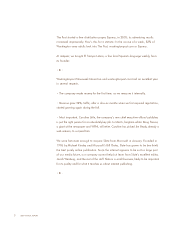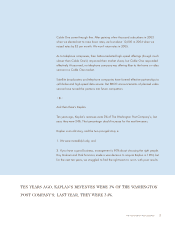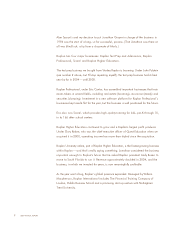Washington Post 2004 Annual Report Download - page 6
Download and view the complete annual report
Please find page 6 of the 2004 Washington Post annual report below. You can navigate through the pages in the report by either clicking on the pages listed below, or by using the keyword search tool below to find specific information within the annual report.
THE POST CONTINUED TO DISTINGUISH ITSELF FOR BRAVE, THOUGHTFUL
COVERAGE OF THE WAR IN IRAQ.
We owed some of the good results to the economic health of the Washington area.
Fueled by government contractor hiring, print employment advertising took off in
January and rose 20% for the year, after three straight down years.
National advertising, under Post veteran Rick Tippett, continued its amazing 20-year
climb, in part because advertisers realize The Post is the most effective way to reach
the most influential people in Washington. National grew 4.0%.
Expense performance was something: up modestly despite an 11.8% climb in the
newsprint bill.
The Post continued to distinguish itself for brave, thoughtful coverage of the war in
Iraq. Anthony Shadid won the Pulitzer Prize for international reporting for his Baghdad
coverage. Anne Applebaum, of the editorial page, won another for her magnificent
book, Gulag, a history of the Soviet-era prison system.
Phil Bennett, who led The Post’s foreign staff through the past five years, became
managing editor, succeeding Steve Coll.
All these achievements were shaded by one problem: Daily circulation fell by 2.6%
and Sunday by 2.3%. That newspapers all over the country also lost circulation does
not help.
With (still) the highest market penetration of any major metropolitan newspaper in the
country to start with, and with outstanding circulation management, our goal is to be
a top performer among metropolitan papers.
4
THE WASHINGTON POST COMPANY

